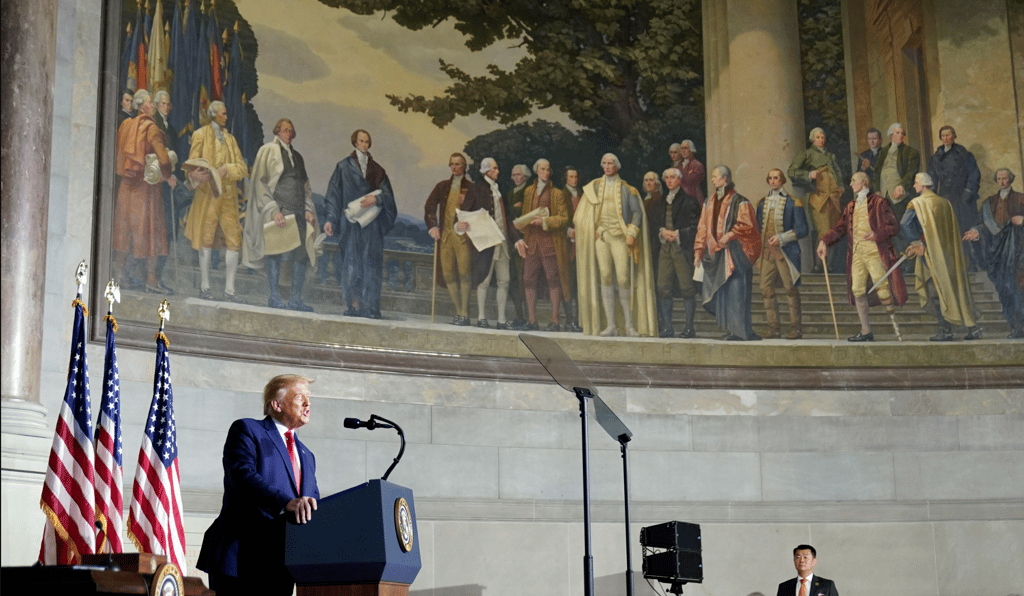Trump’s War on History: Rewriting the American Story for 2026
5/11/20254 min read


Trump’s War on History: Rewriting the American Story for 2026
Posted on Boncopia.com | May 10, 2025
Imagine a history where the messy truths of a nation—its struggles, its failures, its injustices—are scrubbed clean, replaced with a glossy tale of unrelenting triumph. That’s the vision Donald Trump seems to be chasing as he gears up for America’s 250th anniversary in 2026. A recent X post from@outofplaceonli, retweeting a Byline Times article by Heidi Siegmund Cuda, sounds the alarm: Trump is on a mission to “erase history,” and the fight to stop him is heating up. But what does this mean for the future of American democracy—and for how we understand our past?
A Celebration… or a Rewrite?
On January 29, 2025, Trump signed an executive order establishing a White House task force to plan a “grand celebration” for the 250th anniversary of American independence, set for July 4, 2026. According to the Associated Press, the order also revives a 2020 directive to harshly punish those who vandalize statues, while proposing a new national sculpture garden to honor “the giants of our past.” Sounds patriotic, right? But dig deeper, and the cracks start to show.
Historians are raising red flags. A May 5, 2025, Guardian report reveals Trump’s long-standing disdain for historical critiques that don’t fit his narrative. In 2020, he attacked the Pulitzer-winning 1619 Project—which reframes American history through the lens of slavery—as “totally discredited,” claiming it “defiled the American story with deceptions, falsehoods, and lies.” Trump’s vision for 2026 isn’t just a celebration; it’s a curated rewrite, one that glosses over the nation’s history of racism and oppression in favor of a “hyper-nationalist” tale, as historian Johann Neem puts it.
Trump’s Track Record: Ignorance Meets Control
Trump’s approach to history isn’t exactly scholarly. Historian Douglas Brinkley, in the same Guardian piece, recounts a jaw-dropping moment after Trump’s 2016 election: at Mar-a-Lago, Trump admitted he’d never read a book about Abraham Lincoln—yet he’s mused about carving his own face onto Mount Rushmore. This isn’t just ignorance; it’s a deliberate stance. Trump wants a history that serves his image, not one that reflects reality.
His 2020 Mount Rushmore speech laid the groundwork, announcing plans for a sculpture garden featuring American icons—presidents, athletes, even pop culture figures. But critics argue this project, now revived for 2026, distorts history by whitewashing the legacies of slave-owning founders and misrepresenting figures like Martin Luther King. It’s a pattern: control the narrative, erase the inconvenient, and punish dissent.
A Broader Authoritarian Playbook
This isn’t just about history lessons—it’s about power. The X post from@outofplaceonli, shared on May 9, 2025, ties Trump’s historical revisionism to a larger trend of authoritarian control. On the same day, NPR reported that Trump fired all three Democratic members of the Consumer Product Safety Commission (CPSC), an independent agency tasked with protecting Americans from dangerous products. The move, executed via an overnight email, sparked outrage. Commissioner Richard Trumka Jr. vowed to fight back, but the message was clear: Trump is targeting independent institutions to consolidate control.
A February 2025 Foreign Affairs article by Lucan A. Way warns that America is teetering on the edge of “competitive authoritarianism.” Trump’s second term, Way argues, could see him weaponize state institutions against opponents, violate civil liberties, and push policies like the “largest deportation operation in American history”—a plan that could lead to the mistaken detention of thousands of U.S. citizens. Rewriting history fits this playbook: control the past, and you control the future.
Why History Matters
Why should we care about Trump’s historical meddling? Because history isn’t just a collection of dates and names—it’s the story of who we are. When a leader cherry-picks that story to suit their agenda, they rob us of the chance to learn, grow, and confront hard truths. The 1619 Project, for all its controversy, forced Americans to grapple with the legacy of slavery. Trump’s sanitized version? It’s a feel-good myth that leaves us dumber about both our past and our present.
This fight over history also reveals the stakes for democracy. If Trump can erase the parts of America’s story that don’t fit his narrative, what’s next? As Byline Times writer Heidi Siegmund Cuda suggests, resisting this erasure is about more than preserving facts—it’s about preserving the freedom to question, debate, and hold power to account. When history becomes propaganda, democracy suffers.
The Road to 2026: What Can We Do?
So, how do we stop Trump from turning the 250th anniversary into a propaganda fest? First, we amplify the voices of historians, educators, and activists who are pushing back. Projects like the 1619 Project, despite their flaws, remind us that history should challenge us, not comfort us. Second, we stay vigilant about Trump’s broader authoritarian moves—whether it’s firing CPSC commissioners or threatening mass deportations. These aren’t isolated acts; they’re part of a pattern.
Finally, we engage with history ourselves. Read the books Trump hasn’t. Talk to people whose stories don’t make it into the “approved” version. The more we know, the harder it is for any leader to rewrite our collective memory.
What’s at Stake for the Future?
As we approach July 4, 2026, the battle over America’s story is just beginning. Trump’s vision of history might appeal to some—a shiny, uncomplicated tale of greatness. But it comes at a cost: the truth. And in a democracy, truth is non-negotiable.
So, let’s ask ourselves: What kind of history do we want to pass on to the next generation—one that confronts the past with honesty, or one that buries it under a monument to ego? How do we balance celebrating America’s achievements with acknowledging its failures? And most importantly, if we let Trump erase history, what else will he erase next?
hello@boncopia.com
+13286036419
© 2025. All rights reserved.